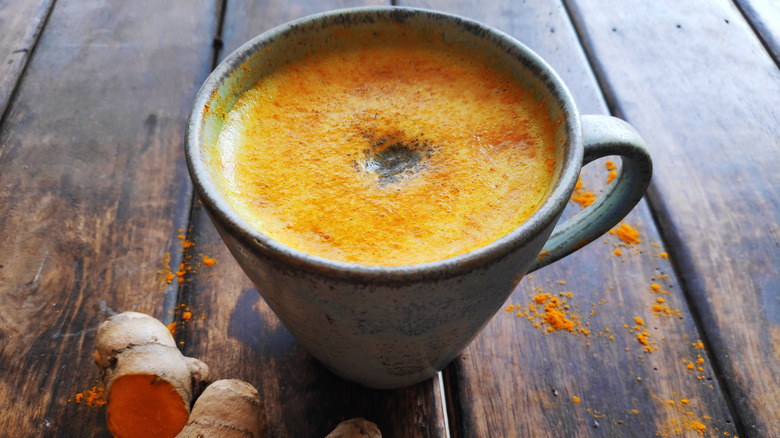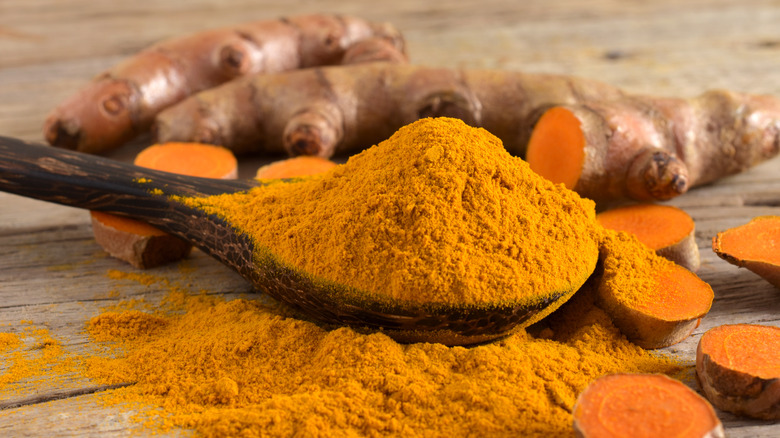The Spice You Should Be Adding To Your Coffee
Coffee is one of the most popular beverages around the world — and for good reason. In addition to its energy-boosting effects, it may protect against heart and liver disease, metabolic conditions, kidney stones, and even cancer. Drinking just three to four cups per day may lower your risk of death from all causes and improve cardiovascular health, suggests a 2017 review featured in The BMJ. As the researchers point out, this beverage contains bioactive compounds that support the proper functioning of your brain, heart, liver, and reproductive organs. It also exhibits strong antioxidant effects, regardless of its caffeine content.
"Surprisingly, coffee is the single best source of antioxidants in the American diet," says registered dietitian Andrea Dunn (via the Cleveland Clinic). Your daily cup of lava provides more antioxidants than green tea, fruits, and vegetables, according to The BMJ. Plus, it's a good source of potassium and B complex vitamins, notes Dunn. Just make sure you don't exceed four cups, or 400 milligrams of caffeine, per day.
But what if you could take your morning coffee to the next level? We're not talking about whipped cream, chocolate syrup, or butter. These extras can add unnecessary calories to your diet, so it's best to avoid them. Instead, consider using spices like black pepper, ginger, cinnamon, turmeric, or vanilla to boost your antioxidant intake.
Why you should start your day with turmeric coffee
Have you ever heard of turmeric coffee? It's just what it sounds like: home-brewed coffee with a dash of turmeric. You may also add other spices, such as cloves or black pepper. This delicious beverage is loaded with antioxidants and bioactive compounds that support optimal health. Curcumin, the active compound in turmeric, fights oxidative stress and inflammation, explains a 2017 review published in the journal Foods. Scientists believe it may reduce arthritis pain, improve blood lipids, and boost brainpower. It appears to be particularly beneficial for people with arthritis, inflammatory diseases, high cholesterol, and metabolic syndrome.
Turmeric may benefit athletes, too. Curcumin, its main component, may reduce exercise-induced inflammation and speed up post-workout recovery (per Critical Reviews in Food Science and Nutrition). Due to its antioxidant effects, it may also decrease oxidative stress and muscle damage. In clinical trials, athletes who took curcumin had better psychological and physiological responses. The Australian Institute of Sport explains that curcumin may help with delayed-onset muscle soreness (DOMS), leading to improved range of motion and reduced pain.
How to make turmeric coffee at home
This spice is generally safe but has poor availability, meaning that it's not fully absorbed into the body. Piperine, the active compound in black pepper, may increase curcumin bioavailability by up to 2,000% (via Foods). Given these aspects, it makes sense to add both turmeric and black pepper to your morning coffee.
Start with a small dose, such as 500 milligrams of curcumin per day, and work your way up to 1,000 milligrams per day. Pure turmeric powder is about 3.14% curcumin by weight, but the concentration may vary from brand to brand (per Nutrition and Cancer). For your morning coffee, use a half teaspoon of turmeric or slightly more, suggests Healthline. If you're not used to it, start with a quarter teaspoon and increase the dosage gradually. Remember that you can also add turmeric to homemade lattes, smoothies, protein shakes, or tea for extra flavor and nutrition.


